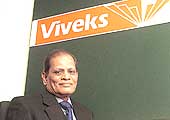|
HEADLINER
G.V. Prasad
AFTER A PATH-BREAKING
Deal in March this year for funding the launch of generic drugs
in the US, Dr Reddy's Laboratories has signed another novel agreement
for drug discovery and development. Christened Perlecan Pharma,
the company has investment from ICICI Ventures (which funded the
earlier deal too) and Citigroup Venture Capital (CVC) International
of $22.5 million (Rs 99 crore), with Dr Reddy's putting in another
$7.5 million (Rs 33 crore). "This partnership marks an important
milestone for the company and will put Dr. Reddy's at the forefront
of drug discovery and development over the next decade,"
Chairman Anji Reddy said in a release. As per the plan, Dr Reddy's
will transfer rights to four new chemical entities (NCEs, or potential
drugs) to the new company, which will then take them through further
development and stages I and II of clinical trials. Thereafter,
Perlecan will out-licence them to a big pharma company for the
next stages of trials and possible launch. "The deals we
are getting into allow us to be a discovery-led organisation without
adversely affecting the current operations," says CEO G.V.
Prasad. It's a model that may soon find imitators.
--E. Kumar Sharma
Apollo-Michelin's Surprise Split-Up
 |
| Apollo's Kanwar: Now, a solo act |
In a surprising move, Apollo Tyres decided
to bail out of its joint venture with Michelin for bus and truck
radial tyres. Citing slow pace of radialisation in India, Michelin
bought out Apollo's 49 per cent stake (worth about Rs 40 crore)
in Michelin Apollo Tyres. Interestingly, however, Apollo says
it will go ahead and launch truck and bus radial tyres on its
own. Apollo's MD & CEO Onkar Singh Kanwar must be hoping that
the French tyre giant, which owns 14.9 per cent of Apollo's equity,
doesn't pull an MRF on it. In the mid-90s, Michelin tried unsuccessfully
to buy into its partner MRF.
Second Time Unlucky?
Escorts chairman Rajan Nanda's second attempt
to sell Escorts Heart Institute & Research Centre (ehirc) ran
aground after brother Anil once again cried foul, leading the
Delhi High Court to put the Rs 650-crore deal on hold, although
money has changed hands. When BT went to press, the next hearing
was slated for October 22. There's no doubt that the sale of ehirc
is critical to Escort's turnaround plans. Recently, the company
had revamped its board after it defaulted on loans. "We expect
the sale to reverse our fortunes," says Shailesh Tandon, Escorts'
CFO.
 |
| Tata Motors' Ravi Kant: IR snafus |
Tool Down At Tata Motors
workers at Tata Motors' Jamshedpur plant
struck work for one day on September 30 after negotiations over
a bonus payment broke down. The last time the plant witnessed
a strike was in 1969. According to a company spokesperson, there
was no significant loss of production, and the workers returned
to work the following day.
NEWSMAKERS
THE FDI HURDLE
 |
| This fortnight's newsmaker:
Sonia Gandhi's NAC |
In June 2004,
shortly after the united progressive Alliance came to power in
India, its Chairperson and the head of the single largest constituent
of the coalition, Sonia Gandhi, instituted a National Advisory
Council. Apart from her and Congress idealogue Jairam Ramesh (who
has since become a Rajya Sabha MP), the council comprised some
of India's best-known economists, technocrats, even activists.
The objective behind the creation of the NAC was, to cut to the
chase, equitable development, to ensure that the government's
decisions were fair and benefited everyone concerned. That's laudable.
Only, it emerges, the NAC has written to the Ministry of Steel,
which, in turn, has written to the Orissa government, asking for
some clarification on just who Posco's $12-billion (Rs 52,800
crore) project in the state will benefit, and how. The Orissa
government and Posco had bickered over the terms of the deal before
finally reaching some sort of agreement and signing an MoU, and
it is likely that neither party is happy with this turn of events.
The questions asked by the NAC can be asked of any project and
do serve to ensure that the local administration does not ignore
everything else in its desire to attract foreign investment. The
buzz in government circles is that while that could be the case,
the NAC's question may have also been brought about by its concerns
over iron ore allotments to Posco, an anti-Posco corporate lobby,
even the desire to do the BJD that rules Orissa out of some glory.
Whatever be the cause, the questions have been asked and now need
to be answered.
-Ashish Gupta
NUMBERS
OF NOTE
$54
trillion (Rs 23,76,00,000 crore): Global wealth by 2025, a 36
per cent decline from $85 trillion (Rs 37,40,00,000 crore) now
according to consulting firm McKinsey. Japan, the US, the UK,
and Italy will witness a decline in wealth, while India and China
will see an increase
$40 billion (Rs
1,76,000 crore): The debt owed by 18 of the poorest nations to
the International Monetary Fund that has been written off. A further
nine countries could become eligible in future and total relief
could rise to $55 billion (Rs 2,42,000 crore)
100: The number
of additional restaurants McDonald's plans to set up in India
over two years, taking total count to 180 by 2007
Rs 35 crore:
The value of ghee supplied by Karnataka to Tirupati for their
famous laddoos. The temple's annual requirement of ghee is said
to be 1,500 tonnes
10,000: The number
of people who could be dying each year in the Asia-Pacific region
as a result of factors associated with global warming such as
severe weather and mosquito-borne diseases, according to the World
Health Organization
600: The number
of websites forced to stop free streaming and download of Indian
music or close it altogether after legal notices were despatched
to them by the Indian music industry. Most of these sites are
run by NRIs based in the US. There are over 350 legitimate online
music sites globally
2.5%: Proportion
accounted for by India in global trade in goods and services.
For China, the figure is 10.5 per cent
4 million: Number
of Chinese workers who toil in 22,000 factories, churning out
everything from patio chairs to power tools. The average factory
wage is about 40 cents an hour
10 million tonnes:
Volume of liquefied petroleum gas (LPG) consumed by Indian households,
hotels and restaurants every year
$32 billion (Rs
1,40,800 crore): The amount American airlines have lost over the
past four years, from terrorist attacks, the Iraq war, the SARS
epidemic in Asia and competition from new low-cost carriers
Drugs
That Talk
RFID makes its way into Indian pharma.
 |
| Bartronics' Prakash: RFID
evangelist |
It may be the ultimate
cradle-to-grave accounting of drugs for pharma companies. RFID,
or radio frequency identification, is beginning to find takers among
drug manufacturers in India. Bartronics, a Hyderabad-based company
that vends the smart-tag technology in India, says that it has signed
deals with four pharma companies already to implement it on a pilot
project basis and is in talks with nine others. The benefits of
RFID: A much better supply chain management, spanning everything
from lot and batch tracking to expiration date management to curbing
spurious drugs. The RFID tag, which can be attached to or incorporated
into a product, contains an antenna and a programmable memory chip
to communicate wirelessly with an RFID reader, thereby allowing
inventories of finished drugs and raw materials to be updated real
time. In India, Dr Reddy's Labs is looking at using RFID tags domestically,
although it is already using the technology on a trial basis for
what it sells in North America. Says J.N.J.J. Shankar, Vice President
(Supply Chain Management), Dr Reddy's Labs: "Cost is a major
hindrance, besides which the technology is still nascent."
Cost is really the bigger issue. Globally,
RFID tags cost between 40 and 50 cents, and companies like Pfizer
and GlaxoSmithKline use it on specific drugs; the former uses
it on its Viagra and the latter on its anti-aids drugs, Combivir
and Epivir. In India, RFID tags cost Rs 30 apiece, but here's
the problem: Unlike in the US, drugs are low priced in India.
Therefore, to convince a manufacturer to use a Rs 30-tag on a
cough syrup that costs Rs 19 isn't possible. A complete roll out
could cost a drug maker Rs 2 crore. But Bartronics' Vice President
Bhanu Prakash says that prices are coming down and may soon become
viable on a mass scale. Until then, though, drug makers will prefer
to manage their stocks the old-fashioned way.
-E. Kumar Sharma
A Category
Killer On The Prowl
Durables retail giant, Viveks, thinks big.
 |
| Viveks' Setty: Big in south,
but missing in north |
Last year, the
Chennai-based consumer durables giant, Viveks, sold 34,000 refrigerators,
67,000 CTVs, 27,000 washing machines, 74,000 mobile phones, 25,000
DVDs and 6,000 air-conditioners-the most by any organised retailer
in the country. But the family-owned retailer, called a category
killer because it specialises in one category, wants to get bigger
still. "I have 52 of my own stores now, but by March 2008,
I want to have a 100 in the south alone," says Viveks' Chairman
and Managing Director, B.A. Kodandarama Setty. Because of the
sheer volume of its annual sales (projected at Rs 350 crore this
financial year), Viveks has already earned the respect of large
manufacturers. Says Ravinder Zutshi, Deputy Managing Director,
Samsung India Electronics: "Viveks has grown from pioneer
status to high-scale retailing, and growth will bring even better
understanding of relationships (with manufacturers)." As
a first step, Setty plans to open stores in Hyderabad, Vijayawada
and Visakhapatnam, besides adding some more in Bangalore. By his
own estimate, he will need between Rs 75 crore and Rs 100 crore
to fund the expansion. But money, he says, is not a problem; time
is. "It may so happen that I cannot afford to wait till 2008
to look further (read: go national)," says Setty, who has
two other retail chains in Jainsons and Premier. After all, it's
only a matter of time before foreign investment is formally let
into retail.
-Nitya Varadarajan
Brokers
On Edge
Are penny stock dealers in the clear?
 |
| Indiabulls' Banga: Nothing to worry
about |
Last
fortnight, when market regulator Securities & Exchange Board
of India (Sebi) came down heavily on some penny stock promoters
for allegedly manipulating their stock prices, it also had a sharp
rap on the knuckles for the brokers involved. This came on the
heels of Sebi's action to debar 11 brokers of the Calcutta stock
exchange for jacking up prices and creating false volumes through
a series of self deals and cross deals.
Whilst price rigging on the Kolkata bourse
doesn't come as a surprise, the investing community in Mumbai
is still unclear about the involvement, and culpability, of high-profile
brokerages like Indiabulls Securities, Fortis Securities and India
Infoline Securities. Sebi ordered these firms not to buy, sell
or deal in securities on behalf of the promoters and directors
of IFSL, one of the companies it suspended. Do these broking houses
need to worry? Not really, says Gagan Banga, Executive Director,
Indiabulls Financial Services: "We have been ordered not
to trade in the stock on behalf of the promoters and their directors.
However, we are still allowed to trade in the stock for other
investors. This is a protective action from Sebi, which feels
some malpractices have been taking place in the stock (of IFSL)."
Other than IFSL, Indiabulls has also been ordered not to trade
on behalf of the promoters, directors and clients of Prime Property
Development, another company in which Sebi suspects price-rigging.
Adds an official at India Infoline Securities: "In our case
it was a client named Jay Shah, registered with our Ahmedabad
office, who has been debarred from trading in IFSL. However, he
can trade in other securities."
Sebi's investigations into these penny stocks,
say market observers, could go on for another six to nine months.
So far the brokerages have escaped the watchdog's wrath, but if
Sebi does dig up evidence of a link between the brokers, the rigged
stocks and their promoters, there might just be more trouble ahead.
-Mahesh Nayak
Sachin
Forever
The cricketer may ail, not his brand.
 You'd
be wrong if you thought the news of Sachin Tendulkar's return
to the grounds (he will play the Challenger Trophy in October)
has lifted the spirits of brand managers whose products he endorses.
For, their spirits never sagged-his long hiatus from cricket notwithstanding.
"Sachin's name is synonymous with cricket," says Vipul
Prakash, Executive Vice President, Marketing, PepsiCo, whether
he hits the boundaries or not. "The brand promise he holds
is still unparalled, and we intend to carry the association forward
in the coming years," adds Prakash. Sachin has been endorsing
the Pepsi brand for the past 15 years. You'd
be wrong if you thought the news of Sachin Tendulkar's return
to the grounds (he will play the Challenger Trophy in October)
has lifted the spirits of brand managers whose products he endorses.
For, their spirits never sagged-his long hiatus from cricket notwithstanding.
"Sachin's name is synonymous with cricket," says Vipul
Prakash, Executive Vice President, Marketing, PepsiCo, whether
he hits the boundaries or not. "The brand promise he holds
is still unparalled, and we intend to carry the association forward
in the coming years," adds Prakash. Sachin has been endorsing
the Pepsi brand for the past 15 years.
Sachin's contract with WorldTel, the celebrity
management company started by late Mark Mascarenhas, is due to
expire this year. WorldTel had signed him up for 1996-2000 for
Rs 30 crore and Mark retained him amidst fierce competition the
second time, by promising Rs 100 crore for 2001-2005. The master-blaster
is till date the most expensive sports celebrity, commanding a
price tag of around Rs 4-5 crore a deal, despite the rise of new
stars in sports. This year, the fight for his account has already
started with some of the top agencies offering at least 50 per
cent more than what he got the last time around. "Sachin
commands an equity that extends beyond the grounds. He is one
celebrity who is not given to any controversies, personal or professional
and hence, has an undiluted appeal," says Sanjay Lal, Chief
Executive Officer, PDM International. The duration of his new
contract, however, might shrink this time, owing to concerns that
he might formally bid adieu to cricket in the next two to three
years.
-Archna Shukla
NOTED
Named:
By Forbes magazine, three Indian firms, Infosys, Wipro, and ICICI
Bank, in its listing of The Asian Fab 50. Japan's Toyota Motor
Corporation ranks #1. Infosys comes in at #17, Wipro, #20, and
ICICI bank, #32. Japan has 13 companies in the list, Australia,
10, South Korea, eight, China, one (Petro China) and Hong Kong,
six.
Logged: By the
Indian economy, an 8.1 per cent growth in GDP in the April-June
quarter of 2005-06. Much of this was propelled by a growth in
the manufacturing sector, of 11.3 per cent, and services sector,
of 9.8 per cent. The government's targeted GDP growth rate for
the entire year is 7 per cent.
Hiked: By the
Aditya Birla Group, its stake in Idea cellular to 50.15 per cent.
The increase could possibly signal the revival of the group's
interest in the telecommunications sector. Idea has around six
million subscribers and has a fairly wide reach across Kerala,
Maharashtra, Delhi, Gujarat, Andhra Pradesh, Madhya Pradesh, Haryana
and UP West.
Announced: By
Philips Semiconductors' Chief Executive Officer Frans Van Houten
on a recent visit to India, the company's intent to work with
local suppliers and launch a mobile phone with a price-tag of
$20, under Rs 1,000, sometime in 2006.
Signed: By Tata
Teleservices, a five-year Rs 1,000-crore outsourcing deal, of
its entire IT infrastructure management, with Tata Consultancy
Services. In early 2004, Bharti Tele-Ventures had entered into
a similar arrangement with IBM.
Alleged: By UNCTAD,
in its World Investment Report 2005, that China fudges its foreign
direct investment numbers substantially. The same report says
that India attracted over $5 billion (Rs 22,000 crore) of FDI
in 2004.
THE
PHOENIX RISES
 It
seems somehow apt that the phoenix, a mythical bird that is the
symbol of renewal, is the corporate logo of Jessop & Company,
a Kolkata-based erstwhile public sector company that was acquired
in 2003 for a mere Rs 18.18 crore (it had accumulated losses of
Rs 133 crore then) by a city-based chartered accountant Pawan
Kumar Ruia (left; no relation to the Ruias of Essar). Today, thanks
to a deal with the Board for Industrial and Financial Restructuring
that will reduce its capital base and debt and allow it to make
a rights issue, the wagon-maker looks set to effect a turnaround.
"That's a significant step forward," admits Ruia. Yes,
and another exhibit in the case for disinvestment. It
seems somehow apt that the phoenix, a mythical bird that is the
symbol of renewal, is the corporate logo of Jessop & Company,
a Kolkata-based erstwhile public sector company that was acquired
in 2003 for a mere Rs 18.18 crore (it had accumulated losses of
Rs 133 crore then) by a city-based chartered accountant Pawan
Kumar Ruia (left; no relation to the Ruias of Essar). Today, thanks
to a deal with the Board for Industrial and Financial Restructuring
that will reduce its capital base and debt and allow it to make
a rights issue, the wagon-maker looks set to effect a turnaround.
"That's a significant step forward," admits Ruia. Yes,
and another exhibit in the case for disinvestment.
-Ritwik Mukherjee
NOT
YET, MR PRESIDENT
|
|
|
President Kalam: Ahead of the curve
|
On a recent visit to
the north east, India's President Abdul Kalam announced that an
aids vaccine being developed by the National AIDS Research Institute
(NARI) in Pune would be commercially available in the next three
to four years. If the pharma industry was surprised at this, it
is because the vaccine has gone into phase one of clinical trials
only in February this year and it usually takes seven years from
then to the commercial launch of a drug. Dr Ramesh Paranjpe, Officer-in-Charge,
NARI, is not willing to comment on the President's statement,
but admits the three phases that precede the launch could take
between five and seven years. "I cannot comment on Phase
II, which is something we will decide on only after the completion
of Phase I," he says. Right now, enrolment for the clinical
trials is still on. NARI's vaccine development programme is being
carried out in association with the International Aids Vaccine
Initiative, a New York-based entity, the National Aids Control
Organisation and the Indian Council for Medical Research. All
names of note, but it will take time, maybe till 2012.
-Priya Srinivasan
|














 It
seems somehow apt that the phoenix, a mythical bird that is the
symbol of renewal, is the corporate logo of Jessop & Company,
a Kolkata-based erstwhile public sector company that was acquired
in 2003 for a mere Rs 18.18 crore (it had accumulated losses of
Rs 133 crore then) by a city-based chartered accountant Pawan
Kumar Ruia (left; no relation to the Ruias of Essar). Today, thanks
to a deal with the Board for Industrial and Financial Restructuring
that will reduce its capital base and debt and allow it to make
a rights issue, the wagon-maker looks set to effect a turnaround.
"That's a significant step forward," admits Ruia. Yes,
and another exhibit in the case for disinvestment.
It
seems somehow apt that the phoenix, a mythical bird that is the
symbol of renewal, is the corporate logo of Jessop & Company,
a Kolkata-based erstwhile public sector company that was acquired
in 2003 for a mere Rs 18.18 crore (it had accumulated losses of
Rs 133 crore then) by a city-based chartered accountant Pawan
Kumar Ruia (left; no relation to the Ruias of Essar). Today, thanks
to a deal with the Board for Industrial and Financial Restructuring
that will reduce its capital base and debt and allow it to make
a rights issue, the wagon-maker looks set to effect a turnaround.
"That's a significant step forward," admits Ruia. Yes,
and another exhibit in the case for disinvestment.